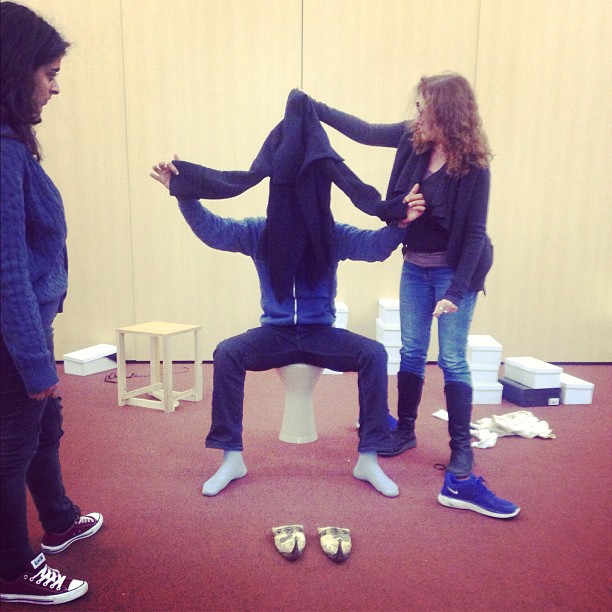
The rehearsals for Metta Theatre’s upcoming show Arab Nights started last Monday at English Touring Theatre in Waterloo. This was the stage of my work with Metta Theatre that I was most looking forward to, as I love being in rehearsal rooms.
These however are only the second professional rehearsals I have been able to observe and the process was extremely enlightening. It was also a relief to realise that professionals are allowed tea breaks too! The process started with a meet and greet with the company and the cast, and then straight into a read-through of the script, which was being videoed throughout to send to our six authors.
Hearing the script (which is six separate tales) read out loud by the actors and pulled together in its order really made the experience seem real, and the power of the work’s message was clear, even read sitting down in a circle with scripts. The rest of the first day was dedicated mainly to text work, so Poppy and the actors could start discussing how they had responded to the various authors’ plays, as well as getting to know our rehearsal spaces facilities, and working out a mark up, and what props each scene would require.
The next rehearsal I attended was mainly focussed around work on The Tale of The Dictator’s Wife by Tania El Khouri, and was attended by Tania herself. It was interesting for me to watch the three creative components of a play - playwright, director and cast – interacting in one room about the work. Tania told the two actors involved in her piece how she visualised her characters, and described to Poppy and Will the set she imagined for her piece. Poppy and the cast then worked on the movement of this tale. The tale is set on an extremely innovative set of an ipad/bed which the character of the First Lady must manipulate realistically. The session involved quite a lot of everyone in the room lying on the floor with their legs in the air, and I started to understand why actors don’t wear skirts to rehearsals!
I have also been in the rehearsal room while the company worked on one of the most complicated and also most beautiful tales The Tale of the River Brides by Chirine El Ansary. I watched as Poppy and the cast discussed back-stories for the characters and weaved speeches through a megaphone and a drum into a tale set on an aeroplane. I was impressed how simply by the way the actors were placed and how they moved the studio became transformed into what was clearly an aeroplane.
Yesterday Sue Buckmaster, the Artistic Director of Theatre-Rites, who is a leading expert on puppetry, attended rehearsals. She was there to help the cast learn all the rules of her art. I have loved puppetry since I was a small child but have never understood at all how it was achieved. It was almost magical to see how the company and Sue worked together so that what at the beginning looked to me like a book with a scarf round its neck, by the end uncannily evoked the figure of a bent over old man, and how that too could suddenly (with the help of a shoe box) be transformed into a goat!
All in all the rehearsals of Arab Nights so far seem to me to promise an innovative and moving play, with the power to tell a story using in some instances only shoes as both props and characters, and having the opportunity to watch the show develop has been a thrilling experience for me.
Mary Franklin | Tuesday November 6th 2012










